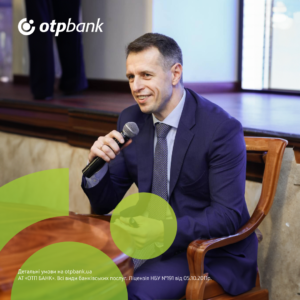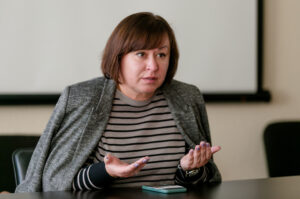
JSC OTP BANK and the European Business Association (EBA) in partnership held an offline event for Ukrainian export-oriented companies, as well as all business representatives interested in export opportunities.
“Exporters: Talk & Network” became a platform for discussing the challenges faced by companies in international markets, as well as finding ways to expand exports of Ukrainian goods and services.
In particular, Volodymyr Mudryi, Chairman of the Board of OTP Bank, mentioned programs from international organizations as opportunities for exporters. In his speech, he emphasized that the Bank’s mission today is to build a bridge between global companies and donors represented in Ukraine.
“In order to work in our country, all international organizations need a responsible and reliable partner with a history and a good reputation. Someone with whom you can speak the same language. So, for global companies, we act as a kind of “translator” of the needs that exist in our market. This is one of our missions,” said Mr. Mudryi. He emphasized that OTP Bank was among the first to start cooperation with the EBRD, and now it also has extensive programs with IFC. “In addition, within the framework of cooperation with the USAID Project “Investments for Business Sustainability”, we have closed one program of co-financing for MSMEs on preferential terms ahead of schedule, and recently received the second tranche to support business,” the banker emphasized.
However, in addition to global instruments such as programs with international companies, the Bank also supports exporters in their daily work. According to V. Mudryi, OTP BANK has developed profitable and customized services and products – a separate module “Currency Contracts” in the Click OTPay client-bank system, which has complete information on the status of settlements under export and import contracts, currency SWAP, lending, the “Trading Platform” service, which gives the client the opportunity to fix the exchange rate from 1 cent, and also provides access to the exchange of exotic currencies. “We try to optimize and personalize the work with the Bank for our clients as much as possible, to make it as convenient as possible. To this end, we have set up many processes: for example, any new contract must be processed and confirmed by the Bank on the same day,” said Mr. Mudry.
During the event, he advised entrepreneurs to expand their knowledge of ESG (environmental, social, corporate governance) sustainability standards, which are increasingly required by international organizations from Ukrainian businesses. “It is inevitable and it is already knocking on our door. There are requirements from the EBRD, the World Bank, and the National Bank of Ukraine is also planning to develop its own standards. So now, at the level of the NABU (Independent Association of Banks of Ukraine), we are trying to bring together all the requirements so that there is a common understanding of what we will implement, as well as to develop a schedule for the transition to ESG standards,” said Mr. Mudryi.
Yulia Vitka, Deputy Project Manager, spoke about various programs for exporters and SMEs and the opportunities of the USAID Investment for Business Sustainability Project. Ruslan Gashev, Chairman of the Board of Export Credit Agency, presented ECA’s experience and outlined changes in the Agency’s work that allowed it to expand cooperation with business representatives.
“Exporters: Talk & Network: tools to support export-oriented companies” was the third offline event for exporters that OTP BANK and the European Business Association held in partnership. Previous meetings with business took place in the summer and spring of 2024.

In Ukraine, the administrator of the town-planning cadastre at the state level has been working since October 1, the connection of local governments to the state cadastre has begun, according to Natalia Kozlovska, Deputy Minister of the Ministry of Community Development, Territories and Infrastructure (Ministry of Infrastructure), during an extended meeting of the Confederation of Builders of Ukraine on Tuesday.
“Now local governments must upload to the urban planning cadastre the available urban planning documentation and all approved DPTs. We have started connecting local governments to the town planning cadastre,” Kozlovska said.
As specified in the press service of the Ministry of Infrastructure, the state enterprise “Administrator of town-planning cadastre at the state level”, which is entrusted with these functions, will also be the administrator of the Unified State Electronic System in the field of construction (USESS) and the Unified State Register of Addresses (USRA).
The administrator’s task is to ensure transparency, accessibility and efficient management of the Town Planning Cadastre at the state level. It is expected that the work of urban cadastre at the state level will contribute to greater transparency in urban planning, development of digital economy and improve conditions for investors.
As reported, the Cabinet of Ministers approved the launch of a two-year pilot project for the implementation of the town-planning cadastre at the state level by Resolution No. 909 “Some issues of realization of the pilot project on the implementation of the town-planning cadastre at the state level”.
The cadastre, in particular, provides services to support the development, verification of draft documents, as well as their preservation in a single register. An electronic cabinet of the Cadastre user has also been introduced.
As it is supposed, Gradkadastr will be connected with other information resources, in particular, with the Unified Ecological Platform “EcoSystem”, the State Register of property damaged and destroyed as a result of hostilities, terrorist acts, sabotage caused by the armed aggression of the Russian Federation against Ukraine, regarding obtaining information (data) on damaged and destroyed property.
On October 5, the Ministry of Infrastructure will hold a meeting with regional military administrations (OBA) to discuss the issue of providing information on the customers of urban planning documentation, on October 10 the first community training on the functionality of the customer of urban planning documentation is scheduled.
The project on creation of the City Cadastre is implemented in cooperation with the Ministry of Community and Territory Development, Ministry of Digital Transformation with the assistance of the project “Support for Digital Transformation”, funded by USAID and UK Dev. The project partner is the Eastern Europe Foundation.

“Ukrproduct Group, a major Ukrainian producer of packaged butter and processed cheese, increased production of kvass and beverages by 42.5% in local currency in the first half of 2024 and increased their output by 13.1% compared to the first half of 2023, the company said in a report to the London Stock Exchange on Monday.
Sales of kvass and other beverages in the first half of 2024 amounted to GBP1.1 million (…). This growth was driven by a combination of price increases, new product launches, distribution expansion, and favorable weather conditions for sales, the agricultural holding said.
The volume of oil sales in the first half of 2024 amounted to GBP1.8 million, which is 25.6% more in monetary terms and 9.5% more in production compared to the same period last year. Sales were made through the key sales channels – retailers, large distributors and exports.
In the Processed Cheese and Processed Cheese Products segment, sales amounted to GBP10.7 million, which represents a decrease in revenue of 2.2% in local currency and a decrease in volume of 10.8% compared to 1H2023.
“This was mainly due to financial difficulties for some clients and a shift in focus towards profitability,” Ukrproduct Group explained.
Spread sales for the reporting period decreased to GBP1.7 million, down 14.1% in local currency and 13.1% in volume compared to the same period last year. The agricultural holding explained the decline by increased competition in the market.
Skimmed milk powder sales for the six months of 2024 also decreased by 14.2% in local currency to GBP0.5 million and by 14.7% in volume compared to the same period last year, which is a continuation of the downward trend of the previous season.
Due to low prices for skimmed milk powder, the group minimized the production of this product, deciding instead to use semi-finished milk protein as an ingredient in the production of processed cheese, the agricultural holding said.
“Business development in the second half of 2024 remains extremely uncertain due to the ongoing war in Ukraine.
The Group continues to make every effort to implement its strategy in a very challenging business environment, not least by ensuring a stable electricity supply and responding to new challenges. In the next six months, the Group expects to focus on maintaining its existing production capacity, supporting sales volumes and continuously improving operational efficiency,” Ukrproduct Group summarized.
“Ukrproduct Group is a major Ukrainian producer of packaged butter, processed cheese and kvass. The company produces dairy products under the Nash Molochnyk, Nash Syrok, Molendam, and Vershkova Dolina brands and kvass under the Arsenievsky brand.
Ukrproduct Group operates two plants in Zhytomyr (one specializing in processed cheese and the other producing kvass) and two enterprises in Khmelnytsky region: a dairy plant in Starokonstantinov producing packaged butter, spreads, cheese and milk powder, and a dairy plant in Letychiv.
The group’s production capacity allows it to produce up to 70 thousand tons of dairy products per year.

In January-September this year, Zaporizhzhia-based Zaporizhstal Iron and Steel Works increased its rolled steel output by 26.7% year-on-year to 1.829 million tons from 1 million 443.9 thousand tons.
According to the company’s information on Tuesday, steel production during this period increased by 24.7% to 2 million 176.7 thousand tons, and pig iron production by 19.5% to 2 million 297.5 thousand tons.
In September, Zaporizhstal produced 248.6 thousand tons of iron, 203 thousand tons of steel, and shipped 184.1 thousand tons of rolled products.
At the same time, it is recalled that in 2023, the plant operated at an average of 70% of its capacity.
As reported, in 2023, Zaporizhstal increased its rolled steel output by 57.2% compared to 2022, up to 2 million 54.7 thousand tons, steel by 65.4%, up to 2 million 466.9 thousand tons, and pig iron by 35.3%, up to 2 million 718.9 thousand tons.
“Zaporizhstal is one of the largest industrial enterprises in Ukraine, whose products are in great demand among consumers both in the domestic market and in many countries of the world.
“Zaporizhstal is in the process of integration into Metinvest Group, whose major shareholders are System Capital Management (71.24%) and Smart Holding Group (23.76%).
Metinvest Holding LLC is the management company of Metinvest Group.

Franco-German defense concern KNDS has opened a subsidiary in Kiev, which under the name KNDS Ukraine LLC will support cooperation between Ukrainian government agencies, the Ukrainian defense industry and KNDS, the concern’s press service reports.
“The purpose of opening KNDS Ukraine LLC is, among other things, to consolidate the Ukrainian land industry and enable it to more effectively carry out maintenance, repair and overhaul of KNDS systems – including Leopard 1 and 2 tanks, CAESAR and AMX 10RC artillery systems and PzH 2000 self-propelled howitzers – which significantly increases their combat readiness. KNDS and Ukrainian industry also intend to jointly produce in Ukraine 155-mm artillery ammunition and spare parts using advanced technologies,” the report says.
It is noted that the creation of KNDS Ukraine LLC is the result of a joint French-German government initiative, the framework of which was presented on March 22, 2024 by French Defense Minister Sebastien Lecornu and the head of the German Defense Ministry Boris Pistorius in Berlin.